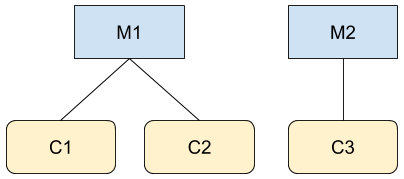CustomerService의 ListAccessibleCustomers 메서드를 사용하여 액세스할 수 있는 고객을 나열할 수 있습니다.
하지만 이러한 유형의 요청에서 어떤 고객이 반환되는지 이해해야 합니다.
액세스 가능한 고객을 나열하는 것은 Search Ads 360 Reporting API에서 요청에 고객 ID를 지정할 필요가 없는 몇 가지 요청 중 하나이며 제공된 login-customer-id를 무시합니다.
결과로 반환되는 고객 목록은 OAuth 사용자 인증 정보를 기반으로 합니다. 이 요청은 현재 사용자 인증 정보를 사용하여 직접 작업할 수 있는 모든 계정의 목록을 반환합니다. 여기에는 계정 계층 구조 내의 모든 계정이 포함되는 것은 아닙니다. 인증된 사용자가 계정에 관리자 또는 기타 권한으로 추가된 계정만 포함됩니다.

위 그림의 두 계층에서 M1 및 C3의 관리자인 사용자 A라고 가정해 보겠습니다. Search Ads 360 Reporting API(예: SearchAds360Service)를 호출하면 M1, C1, C2, C3 계정의 정보에 액세스할 수 있습니다. 하지만 CustomerService.ListAccessibleCustomers를 호출하면 M1 및 C3만 반환됩니다. A 사용자가 직접 액세스할 수 있는 계정이 이 두 계정뿐이기 때문입니다.
다음은 CustomerService.ListAccessibleCustomers 메서드 사용을 보여주는 코드 예입니다.
자바
// Copyright 2022 Google LLC // // Licensed under the Apache License, Version 2.0 (the "License"); // you may not use this file except in compliance with the License. // You may obtain a copy of the License at // // https://www.apache.org/licenses/LICENSE-2.0 // // Unless required by applicable law or agreed to in writing, software // distributed under the License is distributed on an "AS IS" BASIS, // WITHOUT WARRANTIES OR CONDITIONS OF ANY KIND, either express or implied. // See the License for the specific language governing permissions and // limitations under the License. package sample; import com.google.ads.searchads360.v0.lib.SearchAds360Client; import com.google.ads.searchads360.v0.services.CustomerServiceClient; import com.google.ads.searchads360.v0.services.ListAccessibleCustomersRequest; import com.google.ads.searchads360.v0.services.ListAccessibleCustomersResponse; /** List all customers that can be accessed by the authenticated Google account. */ public class ListAccessibleCustomers { public static void main(String[] args) { try { // Creates a SearchAds360Client with local properties file final SearchAds360Client searchAds360Client = SearchAds360Client.newBuilder().fromPropertiesFile().build(); // Creates the Customer Service Client. CustomerServiceClient client = searchAds360Client.createCustomerServiceClient(); new ListAccessibleCustomers().runExample(client); } catch (Exception exception) { System.err.printf("Failed with exception: %s%n", exception); exception.printStackTrace(); System.exit(1); } } private void runExample(CustomerServiceClient customerServiceClient) { ListAccessibleCustomersResponse response = customerServiceClient.listAccessibleCustomers( ListAccessibleCustomersRequest.getDefaultInstance()); System.out.printf("Total results: %d%n", response.getResourceNamesCount()); for (String customerResourceName : response.getResourceNamesList()) { System.out.printf("Customer resource name: %s%n", customerResourceName); } } }
Python
#!/usr/bin/env python # Copyright 2022 Google LLC # # Licensed under the Apache License, Version 2.0 (the "License"); # you may not use this file except in compliance with the License. # You may obtain a copy of the License at # # https://www.apache.org/licenses/LICENSE-2.0 # # Unless required by applicable law or agreed to in writing, software # distributed under the License is distributed on an "AS IS" BASIS, # WITHOUT WARRANTIES OR CONDITIONS OF ANY KIND, either express or implied. # See the License for the specific language governing permissions and # limitations under the License. """Lists all accessible customers.""" import traceback from util_searchads360 import SearchAds360Client def main(client) -> None: customer_service = client.get_customer_service() # Issues a list accessible customer request. accessible_customers = customer_service.list_accessible_customers() result_total = len(accessible_customers.resource_names) print(f"Total results: {result_total}") resource_names = accessible_customers.resource_names for resource_name in resource_names: print(f'Accessible customer resource name: "{resource_name}"') if __name__ == "__main__": # SearchAds360Client will read the search-ads-360.yaml configuration file in # the home directory if none is specified. search_ads_360_client = SearchAds360Client.load_from_file() try: main(search_ads_360_client) except Exception: # pylint: disable=broad-except traceback.print_exc()
